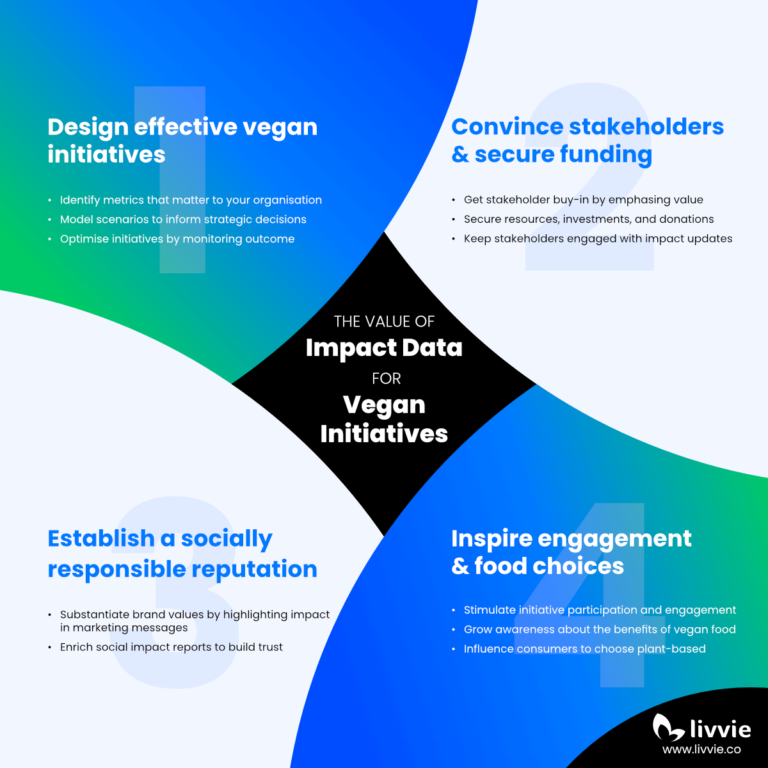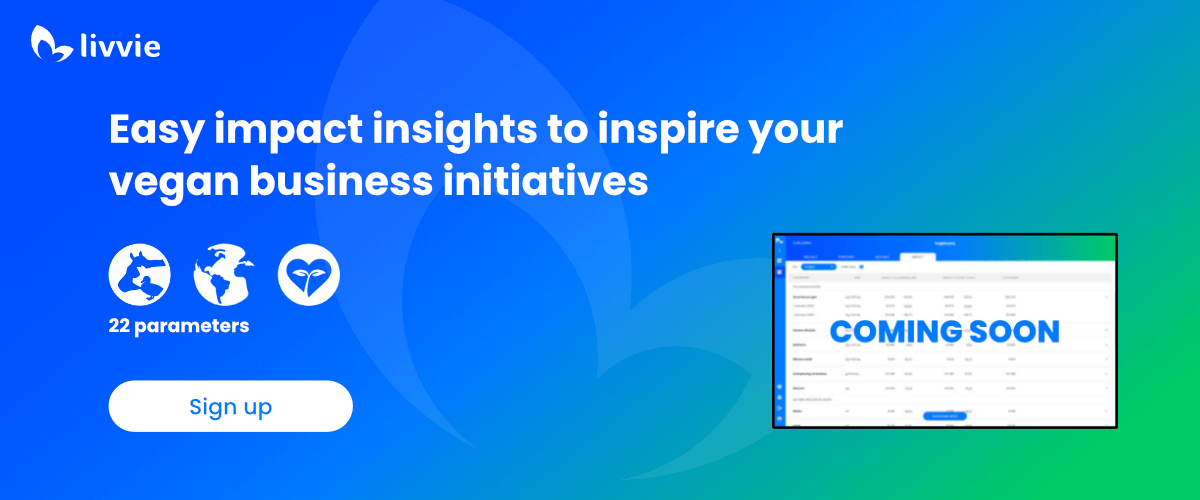How Social Impact Data Supports Vegan Business Initiatives
Written by Johanna van Langen
Published 10 October 2024
Consumers and organisations increasingly recognise the importance of transitioning to a plant-based food system for a sustainable future. By organising vegan initiatives, companies can show their commitment to social responsibility and make a positive impact on society and the environment.
To maximise the benefits of vegan business initiatives, it’s essential to measure and communicate their social impact. This blog explains how social impact data can help you design effective vegan initiatives, secure stakeholder support, enhance brand reputation, and inspire awareness and engagement.

Easily calculate the social impact of your vegan business initiatives
1. Design Effective Vegan Initiatives and Inform Strategic Decisions
Analysing the potential and actual social impact of a vegan food initiative helps to design and optimise it for maximum impact. You can leverage social impact data to ensure effectiveness of initiatives and alignment with your organisation’s mission and values.
Identify Social Impact Metrics That Matter to Your Organisation
Begin by identifying the most relevant social impact metrics for your plant-based business initiatives. Consider the range of benefits of promoting plant-based food choices, including environmental sustainability, animal welfare, and public health. Select metrics that reflect your organisation’s mission and the values of your target audience.
For organisations committed to sustainability, tracking the environmental benefits of your vegan food initiatives is valuable. Measuring reductions in carbon emissions and the conservation of natural resources validates your dedication to sustainability goals.
Healthcare organisations might prioritise metrics related to population health. For instance, offering more plant-based meals in hospitals can lower cholesterol consumption and reduce antibiotic use in animal agriculture.
If animal welfare is central to your mission, track the number of animal lives saved by transitioning to vegan food.
Compare Initiative Impact and Model Scenarios
To ensure that your vegan initiatives have maximum social impact, compare ideas and model various scenarios using forecast data on projected sales or participation rates. A social impact assessment can inform strategic decisions and guide the design of initiatives that deliver the most significant benefits.
Example use cases for social impact assessments
Corporations aiming to increase plant-based offerings in the workplace might evaluate the impact of serving more vegan meals in the cafeteria versus making plant-based milk the default option in coffee machines.
Restaurants can analyse social impact data to decide whether to add more vegan menu options or replace standard ingredients with plant-based alternatives, depending on projected sales.
Manufacturers could assess where the biggest societal and environmental gains lie within their portfolio to align innovation decisions such as recipe changes with brand values. For instance, they could analyse the potential social impact of veganising a single food item compared to removing animal-derived ingredients such as milk powder from multiple products.
Non-profits focused on promoting plant-based diets can use impact modelling to target their efforts more effectively. For instance, should a campaign encourage a large number of people to eat more vegetarian meals, or focus on helping a smaller group fully transition to a vegan lifestyle?
Policymakers can also benefit from analysing the potential social impact of policies that encourage vegan food consumption. Understanding the impact of changes in national production or consumption levels can guide strategies to promote sustainability and public health.
Optimise Vegan Business Initiatives Based on Actual Impact data
Once an initiative is in place, monitor its effectiveness based on the selected social impact metrics and key performance indicators (KPIs). Regularly reviewing this data in team meetings allows for early interventions if the project isn’t achieving the desired impact.
For example, if an initiative to offer more vegan meals in a restaurant isn’t resulting in the expected sales, it may prompt an investigation into the root cause and best practices to stimulate vegan food sales. Similarly, a strategy to switch from red meat to chicken to reduce your environmental footprint might reveal unintended consequences, such as a higher number of animal lives lost. If animal welfare is a priority for your organisation, this insight could lead to a redesign of the initiative to better align with your values.

2. Convince Stakeholders and Secure Funding With Social Impact Data
Tangible social impact data helps to gain buy-in from stakeholders and securing the necessary budget for your plant-based initiatives. By demonstrating the potential and actual impact, you can build a convincing case for organisational and external support.
Convince Stakeholders of the Social Value of a Vegan Initiative
Securing stakeholder buy-in and support is essential for the success of any vegan initiative. The process can vary depending on its scope and the organisational context. Obtaining approval for a temporary vegan challenge for employees might be straightforward. However, aligning stakeholders on more permanent changes in a restaurant menu or product portfolio will require more effort. For non-profits whose mission is the transition towards a plant-based food system, convincing corporate or government representatives can be a core activity.
To start, identify key stakeholders who can influence or make decisions and help generate broader acceptance of your initiative across the organisation. Securing the endorsement of an executive or senior manager can help convince others. Sustainability leaders are particularly valuable allies as transitioning to vegan foods aligns with environmental goals.
When presenting your proposal, emphasise how the project supports the organisation’s mission, values, and business performance. Social impact data strengthens your pitch by quantifying the benefits of the initiative and how the transition to plant-based food contributes to Environmental, Social, and Governance (ESG) goals.
Keep in mind that while senior stakeholder interests align with the organisation’s mission, they are also guided by personal values and motivations. Tailoring your pitch to resonate with what matters most to your audience can improve your chances of securing their support.
Secure Investments and Supporting Resources
Once you’ve convinced stakeholders of the initiative’s value, the next step is to secure the necessary resources for its implementation. Demonstrating the positive social impact of your project is key to obtaining the required budget and personnel.
Mobilise supporting staff
For initiatives like employee awareness programs focused on the benefits of a vegan diet, volunteers may be sufficient to organise it. However, if employees are expected to dedicate work hours to these activities, securing management approval is necessary.
Secure budget
Executing an initiative can require additional funding. Veganising a restaurant menu may demand budget for staff training in plant-based cooking, new recipe development, and marketing. When requesting research and development funds within a company, incorporating the societal and environmental benefits of a new vegan product in your business case can give you an edge.
Obtain capital investment
Vegan start-ups looking for capital investment can appeal to impact investors who are particularly interested in backing socially responsible businesses. Communicating the positive environmental and societal impact of your offerings can help attract these investors.
Attract donations
For non-profits, attracting and retaining sponsors and donors is critical. Providing measurable impact data from your campaigns can boost fundraising efforts by substantiating the value your organisation brings to society.
Apply for public funds
Public funds are available for non-profits or research projects that drive positive change for the planet and society. These funds typically require extensive evidence of the project’s social impact. Investing in impact calculations can be worthwhile if it increases your chances of accessing these funds.

Keep Stakeholders and Sponsors Engaged With Impact Updates
After securing initial buy-in, it’s important to keep stakeholders, investors, and sponsors engaged. Providing regular updates on the progress and impact of your initiative can maintain their interest and ensure ongoing support.
These updates reinforce trust and confidence in the success of your project and lay the groundwork for securing future funding. If the initiative isn’t delivering the expected impact, early engagement with stakeholders allows for timely adjustments to ensure the project stays on track.
3. Establish Your Reputation as a Socially Responsible Business
Measuring the social impact of your vegan initiatives can improve your reputation as a socially responsible business. By reporting out on your contributions to society and the planet, you can build trust and loyalty among customers, employees, and stakeholders.
Substantiate Brand Values and Enhance Marketing Messaging
People are increasingly drawn to organisations that reflect their values. By highlighting the positive social impact of your vegan initiatives, you tap into this values-driven consumer behaviour to attract new customers and grow brand loyalty.
Transparent communication about your contributions to society shows accountability and builds credibility and trust among your audience. Including social impact data in your marketing messaging substantiates your commitment to your mission and brand values. This can differentiate your organisation from competitors and appeal to like-minded consumers.
Moreover, establishing a reputation as a sustainable and socially responsible business can help you attract and retain talented employees. Younger generations, particularly Millennials and Gen Z, prefer to work for companies dedicated to making a positive difference in the world.
Enrich Social Impact Reports
Governments and the public increasingly demand accountability from businesses for their societal and environmental impact. As a result, companies are adopting ESG strategies and the push for detailed impact reporting is growing globally.
Corporate initiatives that stimulate the transition to a plant-based food system contribute to several Sustainable Development Goals defined by the United Nations. By offering more vegan food options your organisation can lower its environmental footprint by reducing carbon emissions and conserving natural resources. Embracing plant-based food also contributes to other ESG goals such as promoting employee health and an inclusive culture.
Incorporating data on the positive outcomes of your vegan initiatives in social impact reports affirms your organisation’s commitment to sustainability and social responsibility. Communicating your efforts to customers, investors, and the wider community strengthens your brand’s reputation and positions you as a leader in driving positive change.

4. Stimulate Initiative Participation and Inspire Conscious Food Choices
Communicating the social impact of your vegan business initiatives can boost participation, engagement, and awareness. By sharing data-driven insights, you can motivate individuals and organisations to join your mission and make informed, ethical food choices.
Stimulate Participation and Engagement
To attract participants for your vegan initiative, highlight the potential impact of their participation through marketing messages such as social media posts. High-profile endorsements from leadership or celebrities can boost visibility and inspire greater participation.
For vegan challenges that rely on individual involvement, showing the collective impact of participants can be a great motivator. Seeing how one person or team can make a big difference for the planet, animals, or their own health with small diet changes is incredibly rewarding and encouraging. This drives initial participation and inspires long-term commitment to sustainable, ethical food choices even after the project has ended.
It’s important to recognise that people are motivated by different values. While health benefits are a main reason to regularly eat vegan food for most people, others may be driven by concerns for animal welfare or environmental protection. To reach a broad audience and inspire widespread adoption of plant-based food, communicate a diverse set of impact parameters that appeal to different motivations.
Grow Community Awareness About the Benefits of Vegan Food
Measuring and sharing the social and environmental impact of your vegan initiatives also plays a role in raising community awareness. By positioning your organisation as a leader in the shift towards a plant-based food system, you can inspire consumers, companies, and policymakers to follow.
Set an example to inspire organisations
By offering more plant-based food and demonstrating your positive to society and the environment, you set an example for other organisations. This can inspire industry partners to adopt sustainable food practices and develop a culture of accountability by openly communicating social impact.
Including impact metrics in business cases and reports can also shift perceptions about the importance of social responsibility in strategic decision-making. If your organisation’s transition to plant-based ingredients affects partners like suppliers, impact data can help them align with your mission and needs.
Certain non-profits aim to influence government representatives to endorse policies that stimulate the production and consumption of vegan food products. Presenting clear, data-backed projections of the impact of policy changes can capture the attention of policymakers and encourage legislative support.
Enrich education about conscious food choices
For non-profits or initiatives focused on raising awareness of the benefits of a vegan diet, social impact data can be a useful addition to educational materials. Calculations on the impact of a vegetarian or vegan diet, makes abstract concepts tangible and personal. Such insights can inspire people to incorporate plant-based foods into their diets or even embrace a vegan lifestyle.

Influence Consumer Decisions
If you intend to sell more vegan food, displaying impact data at key moments in the customer journey can influence purchasing decisions. Most consumers who regularly choose vegetarian or vegan options are driven by health, animal welfare, and sustainability concerns. Highlighting the benefits can be a powerful motivator for consumers to choose a vegan dish.
For policymakers and government organisations, it’s critical to gain public support for initiatives that promote plant-based food choices. Sharing the potential and actual impact of policy changes on a national level can help create buy-in and influence consumer behaviour towards sustainable, healthier diets.
Social Impact Data Enhances Vegan Food Initiatives
Measuring the social impact of vegan initiatives is a valuable strategy for any organisation committed to sustainability, animal welfare, and population health. By analysing social impact data, you can design more effective plant-based initiatives, secure necessary funding and stakeholder support, and establish your brand as a leader in driving positive change. Communicating these impacts helps to educate and inspire others, advancing a community-wide shift towards conscious food choices.
As social responsibility is increasingly expected from businesses, the importance of quantifying the benefits of vegan initiatives will continue to grow.
Estimate and track the social impact of your vegan business initiatives with the Livvie food impact calculator.

Share this article to inspire other organisations to measure the social impact of their vegan business initiatives.

